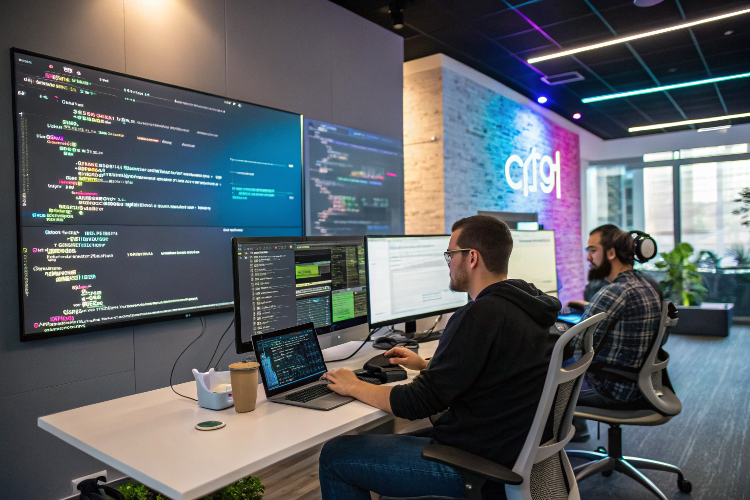Blog
The Impact of AI on Web Development & Design .
Web Development & Design ▪ 2025-03-07

Artificial Intelligence (AI) is transforming every industry, and web development is no exception. From automating coding tasks to improving user experience (UX) with AI-driven design, web development has evolved significantly with the integration of AI technologies. AI-powered tools are making websites smarter, faster, and more efficient, enabling developers and designers to create more interactive and engaging web experiences.
In this blog, we will explore the profound impact of AI on web development and design, the benefits it offers, the challenges it presents, and what the future holds for AI-driven web development.
How AI is Changing Web Development
1. Automating Code Generation
AI-powered coding assistants, such as GitHub Copilot and OpenAI’s Codex, are revolutionizing the way developers write code. These AI-driven tools can:
-
Generate code snippets based on developer prompts.
-
Detect and correct syntax errors in real-time.
-
Reduce development time by automating repetitive tasks.
-
Suggest better code structures for efficiency.
2. AI in Website Builders
Platforms like Wix, Squarespace, and Bookmark have integrated AI-driven web design assistants that:
-
Automatically generate website layouts based on user preferences.
-
Suggest design elements, color schemes, and typography.
-
Optimize website structure for SEO and performance.
3. Enhanced User Experience (UX) with AI
AI-powered UX design tools help developers create user-friendly, intuitive websites by:
-
Personalizing website experiences based on user behavior.
-
Utilizing AI-driven heatmaps to analyze how users interact with a website.
-
Offering real-time chatbot support and AI-powered search functionality.
4. AI-Powered Chatbots & Virtual Assistants
AI chatbots, like Drift, ChatGPT, and Tidio, enhance user engagement by:
-
Providing 24/7 customer support.
-
Answering common queries in real-time.
-
Offering personalized recommendations based on user interactions.
5. AI in Web Accessibility
Web accessibility is critical for inclusivity, and AI is making websites more accessible to users with disabilities by:
-
Automatically generating image alt-text using computer vision.
-
Offering voice navigation for visually impaired users.
-
Enhancing screen reader compatibility with AI-driven text-to-speech tools.
The Role of AI in Web Design
1. AI-Driven UI Design
AI is transforming UI design by helping designers create visually appealing and functional interfaces. AI-driven design tools like Adobe Sensei and Figma’s AI-powered features assist designers in:
-
Generating layout suggestions.
-
Recommending color schemes and typography.
-
Automating image and content adjustments.
2. Personalized Web Design
AI enables websites to adapt dynamically based on user behavior. AI-driven personalization includes:
-
Changing content layout based on user preferences.
-
Customizing recommendations and promotions.
-
Tailoring navigation menus for better usability.
3. AI-Generated Content & Images
AI-generated content tools like Jasper and ChatGPT assist in creating website content by:
-
Writing SEO-friendly blog posts and product descriptions.
-
Generating meta descriptions and headlines.
-
Creating AI-powered visuals and graphics with tools like DALL·E and Midjourney.
Benefits of AI in Web Development & Design
1. Faster Development Time
AI automates repetitive coding tasks, reducing development time significantly.
2. Improved Efficiency & Accuracy
AI-driven tools minimize human errors, ensuring cleaner and more efficient code.
3. Better User Experience
Personalized content recommendations and chatbots enhance user engagement.
4. Cost Savings
AI-powered website builders and automation tools reduce the need for large development teams, saving costs for businesses.
Challenges of AI in Web Development
1. Limited Creativity
While AI can generate designs and content, it lacks human creativity and intuition.
2. Data Privacy Concerns
AI relies on user data, raising privacy and security concerns regarding data collection and usage.
3. Dependence on AI Algorithms
Over-reliance on AI tools can lead to a lack of manual development skills among developers.
The Future of AI in Web Development
The future of AI in web development is promising, with advancements in:
-
AI-driven SEO optimization to improve website rankings.
-
Voice search optimization for better accessibility and user experience.
-
AI-generated design systems that adapt to real-time user behavior.
As AI continues to evolve, developers and designers must embrace these technologies while maintaining a balance between automation and human creativity.

